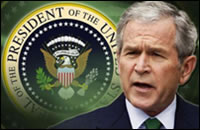Food Aid will not Help Africa!

 |
| Solving the food challenge in Africa goes beyond President Bush and simple food aid |
U.S. President George W. Bush, in particular, has announced about $200 million in emergency food aid. This is in addition to his call upon the U.S. Congress to make another $770 million available for food aid. In total, the emergency food aid from the U.S. alone may total almost $1 billion.
Historically, the U.S. has been the largest provider of food aid. In the 2007 fiscal year, for example, it provided 2.5 million metric tons of commodities to over 70 countries, with a monetary value of $2.1 billion. Within the same period, it provided 1.5 metric tons of emergency food aid to 30 countries valued at $1.2 billion.
In spite of its importance in the event of natural disasters (as humanitarian relief) like the recent cyclone in Burma, food aid never assuages the rising cost of food and food shortages in the long run. The little that is left of domestic food markets is ruined by the inflow of cheap or free food aid. In the long run, regular deliveries of food aid to food-insecure populations makes autocratic governments to avoid much-needed reforms.
President Bush’s concern to feed the hungry is welcome. Such compassion, however, seems to have been largely misdirected. While the U.S. food aid might feed few millions of Africans, it does not do so for long. Africa can feed its own people—the problem is, it has never been allowed to try to succeed.
Eighty-five percent of Africans live in rural communities. They rely on farming to feed themselves and their families. The European Union Common Agriculture Policy and the U.S. farm policy of providing subsidies to farmers have displaced African agricultural products, limiting income that could have been used to re-invest to enhance increased production. This has retarded growth in the continent while at the same time undermining food production. The continent has been held back in food production by harsh local policies and an unfair trade regime inflicted on it by the developed world.
According to the World Bank, if the U.S. and E.U. abrogate or reduce the subsidies to their own farmers, the impact will be felt in lifting millions of Africans out of poverty. Despite calls for phasing out these trade-distorting policies, the U.S and the E.U have been shifting the goalpost—contrary to the agreement reached during the Doha Round. Unfortunately, trade talks to get this agreement ratified have ended in fiasco.
According to a 2001 study by the Economic Research Service of U.S. Department of Agriculture, tariffs have the largest price distortion, with 52 percent, followed by domestic support (31 %) and export subsidies (13 %). Trading with the developed world has not been on equal footing. African countries face high tariffs for their exports. Furthermore, while the developed world has made trade policies skewed against African
Countries.
On the other hand, African countries have not been able to trade among themselves. An increase in trade among African countries by less than five percent, for example, would yield more than $70 billion in annual income. This ultimately would be more than the continent receives yearly as foreign aid. According to International Monetary Fund (IMF) trade statistics in 2005, trade within Africa is a mere 9 % compared to 43% among countries within Asia. Africa's share in world trade has been reduced from 6% to less than 2% in the last two decades. When South Africa is removed from the calculation, this figure shrunk to 0.6 per cent.
The current food crisis, however, has brought to the fore the need for Africa to urgently map out a strategy to meet the growing needs of its inhabitants. Solving the food challenge in Africa goes beyond President Bush and simple food aid. What Africa needs is a further commitment from the U.S. and its allies in the West to inject life into comatose trade negotiations by unilaterally commencing the gradual reformation of its farm policy.
Such action will put pressure on the E.U. to reduce its subsidies as well; spur an increase in economic growth and directly benefit the African farmers whose products are displaced in the world market. Poor countries should not be discouraged by eco-imperialists from embracing available technology to solve their problems. Technology will bring about high yields and abundant food production, making Africa a food-sufficient continent.
